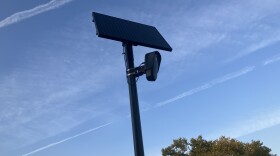Michael Detmer and Rebekah Gossom dreamed up this project several years ago when they worked together at Norton Women’s and Children’s Hospital. Detmer is a music therapist, and Gossom is a speech language pathologist and feeding therapist.
“We have known about the benefits of music in infant development for years,” Gossom said. “It’s something that I've used in my practice, singing lullabies … to calm and organize and help infants with their coordination for feeding.”
Detmer said research shows music helps infants organize their behavioral systems so they can better process the world around them.
“At baseline, it keeps the infant sort of at a stable, calm, alert behavior state,” he said.
Specifically with feeding, he said music can help infants establish and maintain a consistent, rhythmic pattern of “suck, swallow, breathe.”
“It's called entrainment, where the baby will synchronize their physiologic response to an external input, which is music,” he explained.
That’s what LullaFeed is designed to help accomplish.
The device can attach to a wide variety of baby bottles, and a sensor detects when the baby is actively feeding. In response, LullaFeed plays lullabies recorded by a parent or another caregiver.
That the music only plays when the baby is actually sucking on the bottle is meant to reinforce the positive behavior.
“Ideally, it would be the caregiver’s voice … singing a lullaby at the rate of a normal, newborn infant suck pattern to stimulate that normal coordination and rhythm and reinforce the feeding,” Gossom said.
A normal rhythm is about 60 beats per minute, or one suck per second.
That’s already the standard rhythm for a typical lullaby, Detmer noted.
“So if you were to just start singing ‘Twinkle Twinkle, Little Star’ or ABCs, or ‘Old MacDonald,’ you'd sing at about 60, maybe 70 beats per minute,” he said.
The LullaFeed device comes with a companion app that people can use to record themselves singing a song at the right tempo, and then the device can play that recording.
The app also stores data from the device’s sensor tracking how much the baby feeds, so parents can keep tabs on that information.
Next steps for LullaFeed
Gossom and Detmer have spent years developing this product.
They founded the company Innovative Therapeutix as they embarked on this work. Detmer said their earliest financial backing came from a University of Louisville grant program, and they’ve also gotten support from some investors.
Now, the duo is starting the next phase. They scheduled a small quantity of the devices for delivery in late December and plan to get feedback from parents and clinicians on their experience with the new product.
Later, they plan to move on to a full production run for LullaFeed. They’re doing fundraising to prepare for that.
Detmer and Gossom initially came up with the concept of LullaFeed to help babies who struggle with feeding, which is typical for premature infants.
That’s still a core goal. But Detmer said they’ve also had interest from people who want to use this as a bonding technique — such as in the case of a grandparent who wants to record a song for the LullaFeed device to play when they can’t be with their grandchild in person.
“This is a product that comes from two people who are very passionate about infant development and … supporting families and kids,” Gossom said. “We've spent a lot of time and energy into making this right, and we hope other people enjoy it.”






